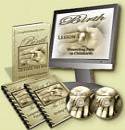Home Birth
Getting Back to Our Roots
History | Advantages | Guidelines
Until 1900, home birth was the typical birth setting for Americans. In fact, more than 90% of people alive today were born at home.
Hospital births did not rise in popularity until the 1920s, when use of motorized vehicles and medical promotion rose. They gained in popularity in that one physician could attend to many patients at a single location while minimizing costs by treating more patients at once.
A major factor in the decrease of home birth at this time was due to the physician's movement to eliminate midwives, their largest source of competition in the growing market of prenatal care and childbirth. Between 1930-1960, physician groups legislated against the practice of midwifery, effectively changing laws across many states to restrict or prohibit their practice.
One of the prominent misconceptions about homebirth is that its practice is unsafe. Logic alone dictates that this is untrue. If most of the Americans alive today were born at home and lived to tell about it, then homebirth must be a viable option.
For those more data-centered individuals, there have been numerous studies conducted over the past 40 years to compare the safety of homebirth as compared to hospital birth.
The consensus from the research shows that homebirth is as safe or safer than hospital birth for low-risk women with a skilled birth attendant.
One such study conducted by Lewis Mehl compared the birth outcomes of 2,092 women. His results showed that the incidence of interventions such as forceps, manual placental traction, episiotomy, laceration, and birth injuries was significantly higher for a hospital birth than for a homebirth.
If you are considering birthing at home, do your research. Find an experienced midwife or other birth companion. Ask them for a list of references or if you may contact other families whose births they've attended. If so, ask the family about their experience and satisfaction with that attendant. Be sure to select an attendant with whom your whole family is comfortable.
Additional information on the pertinent aspects of homebirths can be found in the following pages:
Guidelines for Home Child Birth
REFERENCES
http://www.ncbi.nlm.nih.gov/pubmed/9271961?dopt=Abstract
Olsen
O, Jewell MD. [The Nordic Cochrane Centre, Rigshospitalet,
Blegdamsvej 9, dept. 7112, Copenhagen, Denmark, DK-2100 O.
o.olsen@cochrane.dk] Home versus hospital birth. Cochrane
Database Syst Rev 2000;(2)
Macfarlane A, McCandlish R, Campbell R. Choosing between home and
hospital delivery. There is no evidence that hospital is the safest
place to give birth. British Medical Journal. 2000 Mar
18;320(7237):798.
Kenneth C Johnson and Betty-Anne Daviss. Outcomes of planned home births with certified professional midwives: large prospective study in
North America. BMJ 2005;330:1416 (18 June).
Anderson RE. Anderson DA. [Dept. of Economics, Centre College,
Danville, KY 40422, USA. ] The cost-effectiveness of home
birth. Journal of Nurse-Midwifery. 44(1):30-5, 1999 Jan-Feb.
Chamberlain G, Wraight A, Crowley P [Obstetrics at Singleton Hospital,
Swansea, UK] Birth at home. Pract Midwife 1999 Jul-Aug;2(7):35-9
Aikins Murphy P, Feinland JB. Perineal outcomes in a home birth setting.
[Department of Obstetrics and Gynecology, Columbia University College of Physicians and Surgeons, New York, USA.] Birth 1998 Dec;25(4):226-34
Wiegers TA. van der Zee J. Keirse MJ. [The Netherlands Institute of
Primary Health Care, Utrecht, The Netherlands. ] Maternity care in The Netherlands: the changing home birth rate. Birth. 25(3):190-7, 1998 Sep.
Olsen, O. Meta-analysis of the Safety of Home Birth. Birth. 24(1): 4-13, 1997.
Hafner-Eaton C. Pearce LK. Oregon State University. Birth choices, the law, and medicine: balancing individual freedoms and protection of the public's health. Journal of Health Politics, Policy & Law. 19(4):813-35, 1994 Winter.
Murphy PA. Fullerton J. [Department of Obstetrics and Gynecology, Columbia University College of Physicians and Surgeons, New York, New York 10032, USA. pam15@columbia.edu] Outcomes of intended home births in nurse-midwifery practice: a prospective descriptive study. Obstetrics & Gynecology. 92(3):461-70, 1998 Sep.
Bastian H. Keirse MJ. Lancaster PA. [PO Box 569, Blackwood SA 5051, Australia. hilda.bastian@flinders.edu.au] Perinatal death
associated with planned home birth in Australia: population based study. BMJ. 317(7155):384-8, 1998 Aug 8.
Janssen PA. Holt VL. Myers SJ. Licensed midwife-attended, out-of-hospital births in Washington state: are they safe? Birth. 21(3):141-8, 1994
Sep.
Woodcock HC. Read AW. Bower C. Stanley FJ. Moore DJ. A matched cohort study of planned home and hospital births in Western Australia 1981-1987 Midwifery. 10(3):125-35, 1994 Sep.
Bortin S. Alzugaray M. Dowd J. Kalman J. Santa Cruz Women's Health Center,
California. A feminist perspective on the study of home birth. Application of a midwifery care framework. Journal of Nurse-Midwifery. 39(3):142-9, 1994 May-Jun.
Davis-Floyd RE. [Department of Anthropology, University of Texas at
Austin 78712] The technocratic body: American childbirth as cultural expression. [Review] Social Science & Medicine. 38(8): 1125-40, 1994 Apr.
Sakala C. [Health Policy Institute, Boston University, MA 02215] Midwifery care and out-of-hospital birth settings: how do they reduce unnecessary cesarean section births? Social Science & Medicine. 37(10):1233-50, 1993 Nov.
Kenny P. King MT. Cameron S. Shiell A. Satisfaction with postnatal care--the choice of home or hospital Midwifery. 9(3):146-53, 1993 Sep.
Declercq ER. [Merrimack College, North Andover, Massachusetts] Where
babies are born and who attends their births: findings from the revised
1989 United States Standard Certificate of Live Birth. Obstetrics
& Gynecology. 81(6):997-1004, 1993 Jun.
MacVicar J. Dobbie G. Owen-Johnstone L. Jagger C. Hopkins M. Kennedy J. Department of Obstetrics & Gynaecology, Leicester Royal Infirmary, UK Simulated home delivery in hospital: a randomised controlled trial. British
Journal of Obstetrics & Gynaecology. 100(4):316-23, 1993 Apr.
Cunningham JD. [School of Behavioural Sciences, Macquarie University,
Sydney, NSW, Australia] Experiences of Australian mothers who gave birth either at home, at a birth centre, or in hospital labour wards. Social Science & Medicine. 36(4):475-83, 1993 Feb.
Ford C. Iliffe S. Franklin O. [Department of Primary Health Care, Whittington Hospital, London] Outcome of planned home births in an inner city practice BMJ. 303(6816):1517-9, 1991 Dec 14.
Return from Home Birth to Giving Birth Naturally Home
Page Last Modified by Catherine Beier, MS, CBE
Most Popular
How to Use Acupressure to Induce Labor
Childbirth Relaxation Script MP3s
Nutrition During Pregnancy - Nix the Notion of Eating for Two
Looking for a Birth Professional? Search our Provider Directory
Online Childbirth Classes
Choose 7 week, 12 week, or Self- Paced online childbirth classes available wherever and whenever you need them.
Featured Birth Story
Vanessa's natural birth story shows that when birth is left alone to proceed as it should, it waits for no one - not even doctors or midwives.
Free Pregnancy Tickers
Create a free pregnancy ticker to post on your blog, website, Facebook profile or favorite social media...




